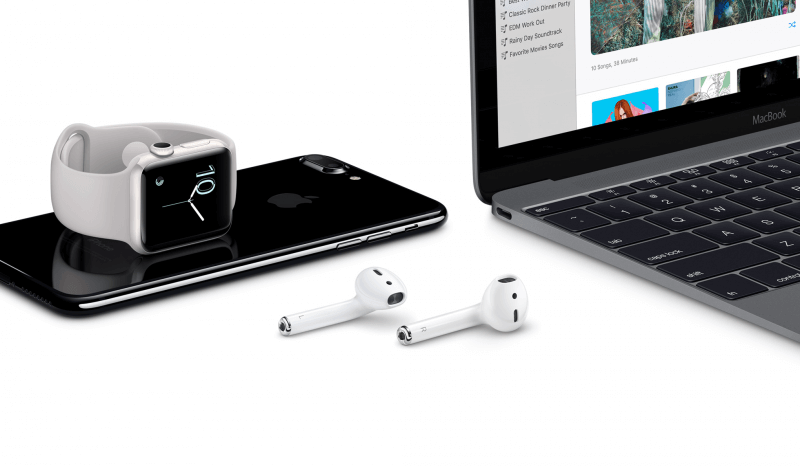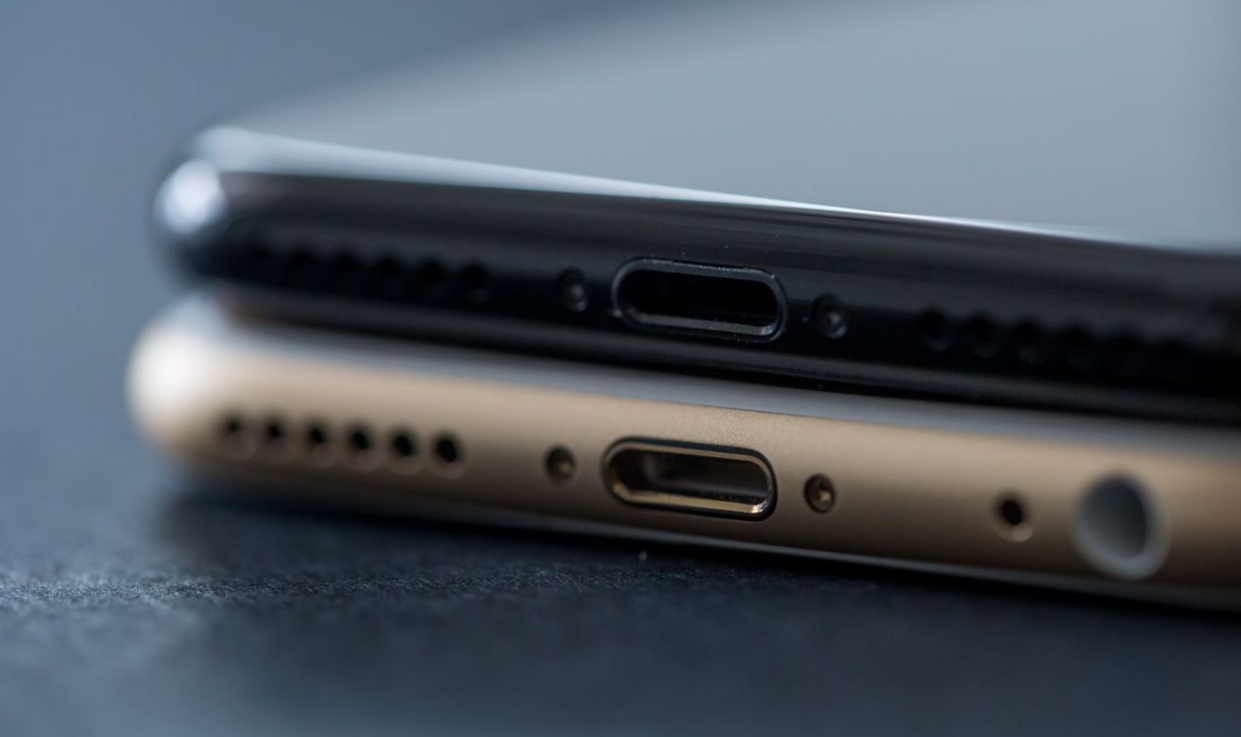
Apple has a long, rich history in the fields of music and audio and its complex and highly influential relationship with those fields was on display once again at the company’s recent iPhone 7 launch event.
The biggest audio-related news of the event was, of course, the removal of the traditional 3.5 mm headphone jack from the iPhone 7. The impact of that one decision will be rippling through the audio industry for years to come. Why? Because of the level of influence Apple and the iPhone have, both with other smartphone makers and with audio accessory and component makers.
The problem is the implications of the move on audio quality are not likely to be good for most people. For all of its convenience, wireless audio connections are generally lower quality than wired connections because of the need to compress the file over the available wireless bandwidth. Given most people are starting with highly compressed MP3 or AAC-encoded music files to begin with, that essentially means you’re degrading an already degraded signal. Not good.
Now, admittedly, there is debate on how much of a difference many people can hear across different levels of audio encoding algorithms as well as wireless transmission compression methods, but common sense tells you mixing the two together can’t be good. (And to be clear, yes, I think most everyone would be able to hear the difference between a wired connection of an uncompressed file and a wireless connection of a compressed file.)
Plus, you don’t see anyone saying, “Oh well, HD video is good enough because that’s the maximum resolution of the iPhone’s screen, so why bother with 4K video? Why should audio be treated differently?” The ability to deliver the highest possible raw media quality—regardless of the device upon which it is played back—should be the goal of any media playback device, but particularly one that’s so incredibly influential.
Of course, some of this harkens back to Apple’s largest impact on music: the creation of the iPod/iTunes combination that completely rewrote the rules on music distribution. The iPod created an amazing level of convenience, flexibility and portability for music that is hard to imagine not having on all our devices today.
However, the iPod also sacrificed audio quality for convenience and the implications of its focus on highly compressed music extend to today. The big problem in the early days of digital music was sound files were very large and took up too much storage capacity in uncompressed, CD-quality form. Audio encoding techniques like MP3 and AAC offered 10x reductions in file size, while leveraging a variety of psychoacoustic techniques to keep the music still sounding reasonably good. It was just too tempting a tradeoff to pass up.
Today, however, storage costs are significantly lower and network bandwidth speeds are significantly higher, so there’s no longer a really viable technical reason to stick with compressed audio. Yet, compressed audio still dominates the landscape, primarily because of Apple’s initial and ongoing influence.
With the company’s efforts and investments in growing their Apple Music service—which they mentioned has now reached 17 million subscribers at the beginning of the iPhone 7 launch event—there is a clear opportunity to once again set a new standard for audio file formats. By choosing to offer uncompressed CD-quality (16-bit, 44 kHz) digital audio files—or even better, high-resolution 24-bit, 96 or 192 kHz—as standard, they could single-handedly and dramatically improve the state of digital audio quality around the world. Now, that would take courage.
Of course, there’s also the possibility that the rumors of Apple purchasing Tidal—a music streaming service that offers uncompressed and high-res audio streaming—could come to pass and Apple would “inherit” the capability.

Image credit: Mashable
In addition to improving the quality of the audio files, Apple could have used the announcement of the headphone jack removal to highlight the second part of the audio quality equation—the quality of the connection to headphones and speakers.
Though few know it, Apple’s proprietary Lightning connector supports the ability to transmit uncompressed and even high-resolution audio in digital format to external devices. Essentially, it provides raw access to the files before they’re converted from digital into audible analog format. In addition, Lightning can provide power for enabling features like noise cancellation without a battery in connected headphones, and access to additional controls, such as triggering Siri. Frankly, it’s a powerful though underutilized interface. Part of the problem is using Lightning requires paying a royalty to Apple, whereas using the 3.5mm audio jack never did.
For a company that talks a lot about how much they love music, Apple sure doesn’t seem to care that much about audio quality, and that’s frustrating.
When Apple removes the headphone jack, they will also, by default, remove the audio DAC (digital-to-analog convertor) from the iPhone because it’s no longer necessary. Instead, with Lightning-based headphones, that digital-to-analog conversion needs to be done by headphones or other speakers directly connected to the Lightning jack.
While that does add costs to these devices, the good news is this allows peripheral companies like Sony, Philips, JBL, Audeze and others to build headphones that leverage high-quality DACs and produce really great sound—depending, of course, on the original resolution of the file being converted—hence my earlier comments. Though details remain unclear, the new Apple Lightning-based earbuds included with the iPhone 7s have none of these extended features and likely use the same more generic-quality DAC that Apple used to include in the iPhone.
What’s odd, and perhaps telling, about Apple’s commitment to higher-quality audio is they now own one of the best-selling headphone makers in the world in Beats and yet, they don’t currently offer a single set of Beats headphones with a Lightning connector and external DAC. Even if Apple wanted to somehow keep the removal of the headphone jack a secret from Beats staffers, there’s no reason they couldn’t have encouraged the development of a set of high-quality, Lightning-based Beats headphones. Yet none exist, nor did Apple even announce one.
Instead, they focused their efforts on announcing wireless Beats headphones based on Bluetooth and some proprietary extensions enabled by their new W1 chip. While there’s obviously nothing wrong with that, the new Solo3 and other Beats headphones seem once again to be focused on convenience over audio quality. In theory, later versions of Bluetooth could support wireless transmission of uncompressed audio, which takes 1.41 Mbits per second, but most Bluetooth audio leverages 128K-256 kbits per second compressed audio. Apple also chose not to support Qualcomm’s AptX technology (originally developed by Bluetooth silicon maker CSR that Qualcomm acquired), which offers support for high-quality audio streamed over Bluetooth.
The new Apple AirPods offer similar capabilities, limitations, and likely, audio quality (though much shorter battery life). Again, the focus is on convenience over quality. If Apple had developed some new higher-quality, lossless methods of transmitting audio to these W1-equipped devices, they clearly would have touted it, yet they didn’t. Instead, much of the focus and concerns around the AirPods were on the possibility of losing them. For the record, I believe this is a big issue but not as much of one when you’re wearing them as when you’re not. Just ask anyone who’s ever misplaced a Bluetooth headset. It happens all the time.
Given how much time Apple spent justifying the removal of the headphone jack at their event, they’re clearly cognizant of what a momentous impact their decision represented and how poorly some might perceive the move. Yet, instead of turning that negative into a positive—as they clearly could have done—they added insult to injury by calling the development courageous. Frankly, it was a missed opportunity of potentially enormous proportions.
The bottom line is, for a company that talks a lot about how much they love music, Apple sure doesn’t seem to care that much about audio quality, and that’s frustrating.
Bob O’Donnell is the founder and chief analyst of TECHnalysis Research, LLC a technology consulting and market research firm. You can follow him on Twitter @bobodtech. This article was originally published on Tech.pinions.
https://www.techspot.com/news/66314-opinion-apple-missed-audio-opportunity.html